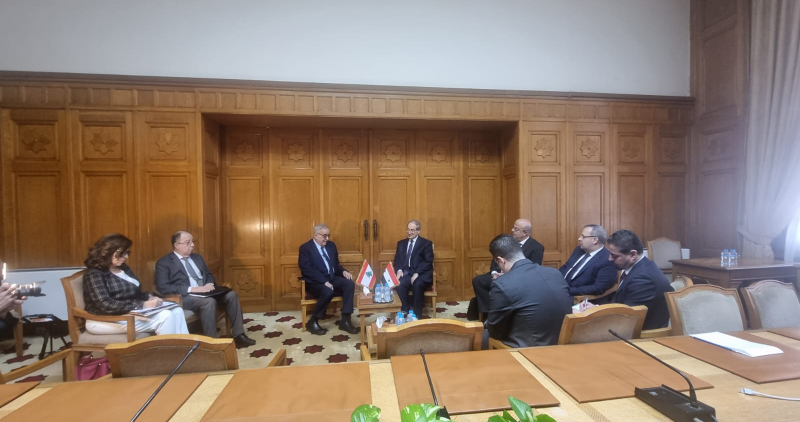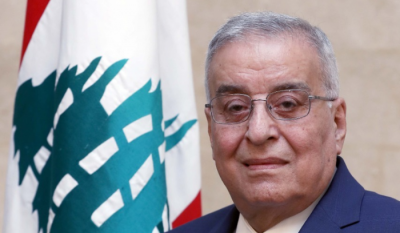
Meeting between Lebanese caretaker foreign minister Abdallah Bou Habib and his Syrian counterpart in Cairo on Mar. 6 (Credit: NNA).
BEIRUT — Lebanese caretaker Foreign Minister Abdallah Bou Habib presented on Wednesday Lebanon's vision for achieving "sustainable stability and calm" on the Lebanese southern border during the 161st session of the Arab League in Cairo.
Bou Habib's vision is based on a comprehensive implementation of UN Security Council (UNSC) Resolution 1701, including a resolution of the land border dispute between Lebanon and Israel, an end to Israel's "violation ... of Lebanon's sovereignty," the reinforcement of the Lebanese army by the United Nations and "friendly countries" and the return of the Lebanese people who were displaced from their southern villages after Oct. 7.
Hezbollah and Israel have been exchanging fire along the Lebanese-Israeli border since Oct. 8, a day after the beginning of the war on Gaza.
UNSC 1701 was agreed upon between Israel and Lebanon in 2006 to end the July war. The resolution explicitly delegates the United Nations Interim Force in Lebanon (UNIFIL) and the Lebanese Army to operate and maintain peace along the so-called Blue Line, an unofficial border line between the two countries created in the year 2000 following Israel's withdrawal from Southern Lebanon.
"As much as we are concerned about the conflict spreading to various parts of the Middle East, we [are always hopeful] of achieving sustainable stability and calm on our southern border," Bou Habib said during the session.
"Our vision is based on the comprehensive and complete implementation of UNSC resolution 1701 ... within an integrated package with clear and declared international guarantees."
The caretaker foreign minister then listed four main components of this "integrated package."
Land border dispute
First, he mentioned the land border dispute between Lebanon and Israel, saying that the southern international border between Lebanon and Israel, demarcated in 1923 and confirmed in the 1949 armistice agreement between the two countries, should be clear.
13 disputed points have not been marked by the Blue Line which are mainly located in the three occupied villages of Ghajar, Kfar Shouba and the Shebaa farms.
Bou Habib stressed the importance of agreeing on the 13 border points "where the Blue Line differs from the internationally recognized border."
"This is aimed at Israel's withdrawal to the internationally recognized border, including its full withdrawal from the Shebaa farms, the Kfarshouba hills and the outskirts of the town of al-Mari," Bou Habib said.
Other components
The second component discussed by the foreign minister is a "definitive end to Israeli land, sea and air violations of Lebanon's sovereignty and the internationally recognized border, which have reached more than 30,000 violations since ... 2006."
"Third: The United Nations and brotherly and friendly countries [should] support Lebanon in extending its authority over all Lebanese territory by strengthening the Lebanese Army, deploying it south of the Litani River and providing it with the numbers, equipment and material support it needs."
The final component is to support the "return of the Lebanese [people], who were displaced from their southern towns and villages after the events of Oct. 7," to their homes.
"Stopping the aggression on Gaza remains the key to de-escalation in the region in parallel with the implementation of our vision for sustainable stability in southern Lebanon and in conjunction with starting a quick mechanism to find a just and comprehensive solution to the Palestinian issue that preserves rights and ensures justice, security and peace in our region," he added.
Bou Habib also said that Lebanon does not want a war with Israel and "has never sought it."
"On the contrary", he added, "we are working hard to prevent the realization of the Israeli government's desire for this war to happen and for its expansion because it will be different from previous wars and will not spare a spot in the Middle East from its consequences."
He warned that such a war "could quickly evolve into a regional war."
